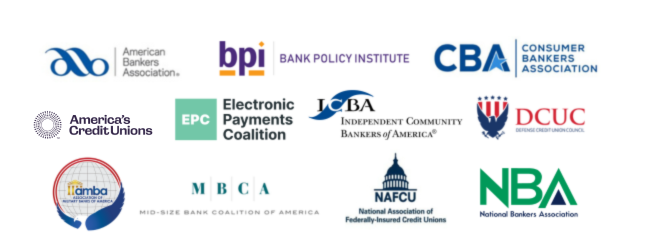Financial Services Industry United in Opposition Against Durbin-Marshall Credit Card Mandates

WASHINGTON, DC – This week, 11 trade associations representing the financial services industry, including the American Bankers Association, America’s Credit Unions, Association of Military Banks of America, Bank Policy Institute, Consumer Bankers Association, Defense Credit Union Council, Independent Community Bankers of America, Electronic Payments Coalition, Mid-Size Bank Coalition of America, and National Bankers Association sent a joint letter to Congress warning any legislative initiatives to expand the power of the federal government to intervene in the U.S. credit card market would harm consumers, small businesses, and financial institutions.
“The payment card system is convenient, secure, and hassle-free,” the groups wrote. “It protects consumers against fraud, guarantees businesses receive timely payments, funds reward programs like cash back, and powers the American economy, from brick-and-mortar establishments to innovative e-commerce platforms 24 hours a day, seven days a week, 365 days a year. The Durbin-Marshall credit card mandates, and any other legislation that intervenes in the credit card market, puts all that in jeopardy.”
Proposals like the misguided Durbin-Marshall credit card mandates or any expansion of the Durbin Amendment would reduce consumer choice, increase fraud risks, and create economic challenges for smaller financial institutions.
The letter highlights a 2024 paper by a University of Miami finance professor which found small businesses would be put “at a further competitive disadvantage” to large corporate mega-stores if the Durbin-Marshall credit card mandates were to become law. The paper estimates almost all of those savings will accrue to retailers with $500 million or more in annual sales, with little going to small businesses.
The groups also noted consumers would lose access to popular rewards programs, and a reduction in rewards and cash back opportunities would significantly harm minority and lower-income consumers. “The International Center for Law and Economics found that ‘77% of cardholders with a household income of less than $50,000’ have an active rewards card. The Durbin-Marshall credit card mandates would take away rewards options from lower-income Americans who value those rewards benefits, not just wealthy individuals,” the associations wrote.
The groups also pointed to evidence showing corporate megastores would not pass along savings to consumers. “The Congressional Research Service released a report stating, ‘it is not clear whether retailers would pass interchange savings on to consumers’ and ‘might face higher incidences of fraud,’” according to the letter.
The associations also highlighted how the U.S. payments ecosystem is rife with competition and choice. “Credit cards, debit cards, buy-now-pay-later, checks, cash, ACH transactions, wire transfers, and real-time payment rails provide businesses and individuals with a multitude of payment options. There is no evidence of significant concentration in the credit card market. In fact, the market for consumer cards concentration is far below the DOJ threshold and is far less concentrated than other industries.”